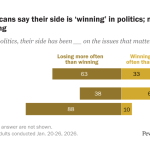It’s the weekend! Tonight, we’re looking at a bright spot for Biden in our battleground polls — and, inspired by a certain Supreme Court justice, we want to hear your stories of political spats with your neighbors.
A series of polls of battleground states released this week was full of doom and gloom for President Biden. He is trailing Donald Trump in five key states he won in 2020, with Nevada and Georgia looking all but out of reach.
But follow me deeper into the data, where there is a bright spot for his campaign, and for other Democrats, too: Nearly two years after the fall of Roe v. Wade, an enduring group of voters prioritizes abortion over all other issues.
Eleven percent of the voters in six battleground states — Wisconsin, Pennsylvania, Georgia, Arizona, Nevada and Michigan — said that abortion was the most important issue in deciding their vote, in the polls by The New York Times, Siena College and The Philadelphia Inquirer. It’s not a huge share, but it’s roughly the same size as the 12 percent of voters who said they cared most about immigration — and it shows that the issue of abortion is still activating voters in the battlegrounds that will probably decide the presidential election.
Among women alone, the share of voters who prioritize abortion above all else rises to 17 percent. It’s edged out only slightly by the economy, which 19 percent of women chose as the most important issue.
The polls show how, as abortion rights have eroded in this country, the issue has become a key motivator. And the surveys underscore the fact that Trump is out of step with most voters on abortion — although that hasn’t yet translated into as much of an electoral vulnerability for him as one might think.
Sixty-four percent of voters in battleground states want abortion to be always or mostly legal, our polls found, a figure that is largely unchanged from a similar poll we did last fall. Trump, who nominated three of the Supreme Court justices who voted to overturn Roe, has said abortion rights should be left to the states — many of which have established strict abortion restrictions in the wake of Roe’s fall. But he’s actually beating Biden among battleground voters who believe abortion should be mostly legal, 49 percent to 41 percent, suggesting those voters either don’t understand Trump’s abortion stance or don’t see it as a deal-breaker.
Supporters of abortion rights view that as an area where Biden and other Democrats can improve their standing.
“What we have is really more work to do in talking to those voters about the choice they face in this election,” said Jessica Mackler, the president of Emily’s List, a political action committee that works to elect women who support abortion rights and that is backing the re-election of Biden and Vice President Kamala Harris.
“When we do that,” she added, “we win.”
Who are the abortion voters?
Our pollsters asked voters an open-ended question about which issue was most important in determining their vote. The voters who chose abortion were whiter and more educated than voters overall, and more likely to be women.
They were also more likely to be Democrats. Twenty percent of Democrats described abortion as their most important issue, compared with 9 percent of independents and just 4 percent of Republicans. (It is possible that some of the respondents who said “abortion” were opposed to abortion rights, rather than supportive of them.)
Democratic women were more than twice as likely to prioritize the issue of abortion than the economy, our polling editor, Ruth Igielnik, told me. Twenty-six percent of Democratic women said abortion was the most important issue, while 11 percent of Democratic women chose the economy. Those figures were practically flipped for Republican women. Seven percent of them chose abortion, while 29 percent picked the economy.
Pamela Norman, 76, a Democrat and retiree from Arizona, said the issue resonated deeply for women of her generation.
“Let me be blunt. I’m Black. So I saw it coming 10 years ago,” Norman said, lamenting that her generation saw abortion rights protected, while her daughters’ generation has seen them rolled back.
Tara Schiraldi, 33, a public defender from West Philadelphia, said the issue of abortion mattered to her, because it represented the idea of the country backsliding on people’s rights.
That’s a major part of why she plans to vote for Biden and Senator Bob Casey, a Pennsylvania Democrat, even though she does not feel particularly enthusiastic about them.
“I’ll take something I’m lukewarm about versus something I feel is directly threatening to myself and the people I care about,” Schiraldi said.
The good news for Trump
When he campaigned for president in 2016, Trump vowed to appoint Supreme Court justices who would overturn Roe. After they did, he bragged that he “was able to kill Roe v. Wade.”
But over the past month, he has tried to obfuscate his stance, calling for the issue to be returned to the states. His administration backed a 20-week abortion ban; more recently, he said he wouldn’t sign a federal ban.
Our polls suggest his approach might be working. Fifty-six percent of voters blame Trump for the end of Roe — but the share of voters who blame Biden, neither candidate or don’t know whom to blame adds up to more than 40 percent of the electorate.
And 44 percent of Trump’s own supporters believe abortion should be either mostly or always legal — which means that, for them, Trump’s stance on abortion and his impact on Roe is simply not a deal-breaker.
That was the case for Ryan Stewart, 38, an unaffiliated voter from Doylestown, Pa., who said he was leaning toward supporting Trump. A libertarian, he believes abortion should always be legal, and he doesn’t think Trump agrees with him — but he sees economic issues as more important to him.
“It’s not really an issue at hand for me,” he said, referring to abortion.
The issue does give some Trump supporters pause, however. Chloe Langley, 18, considers herself a Republican. She believes Biden is too old to serve another term and thinks she’ll vote for Trump in the fall. But her one reservation is on the issue of abortion.
“That’s the only part where I don’t know if I’m going to vote for him,” Langley, a high school student, said. “Just because that’s, like, taking away basic human rights that I believe people should have.”
Supporters of Biden will be working hard to win over voters like Langley. They believe the issue of abortion rights will drive voters away from candidates who don’t agree with them — as long as those voters understand the candidates’ positions.
“When you ask voters, ‘Will you vote for a Republican who holds these views?’ more often than not they’re going to say absolutely not,” said Mackler, the Emily’s List president.
There is some evidence this is the case. A poll by the progressive-leaning group Navigator Research found that 38 percent of voters said they couldn’t vote for a candidate who held an opposing view on abortion — making it the top “deal-breaker” among all the issues they asked about, although inflation and immigration weren’t too far behind.
INTO THE REPLIES
Tell me your neighborhood nightmares (the political ones, anyway)
You can’t choose your family. And you also can’t choose your neighbors.
This week, my colleague Jodi Kantor reported that an upside-down American flag — a symbol of the “Stop the Steal” movement that falsely contended the 2020 election was stolen from former President Trump — flew outside the home of Supreme Court Justice Samuel Alito just before Inauguration Day in early 2021. Justice Alito told The New York Times that his wife had put up the flag in response to “objectionable” signs displayed by their neighbors.
It’s a red flag of sorts that raises urgent questions about Justice Alito’s impartiality as the court was weighing whether or not to hear a case related to the 2020 election. But it’s also a story about a tale as old as the cul-de-sac: the intra-neighbor political dispute.
We want to know: Have you had a fight with your neighbors over politics? Have you fought over yard signs or what makes for an appropriate political display? What are the politics of dealing with the politics of your neighbors?
Please, spill. Tell us the details. We won’t use your name or identifying information unless we contact you and you grant us permission.
THE RUN-UP
… And one more thing
What do Judge Aileen Cannon, Kendrick Lamar and a dog named Cricket have in common?
They are all figures not named Trump or Biden who might make a difference in the contest between Trump and Biden.
This week, I joined The Run-Up, the excellent politics podcast hosted by my colleague Astead Herndon to talk about those three figures, and so many more. You can also hear about a particularly harrowing experience we had during the 2020 presidential campaign. Give it a listen!
Thanks for reading, and enjoy your weekend. I’ll be back Monday.











